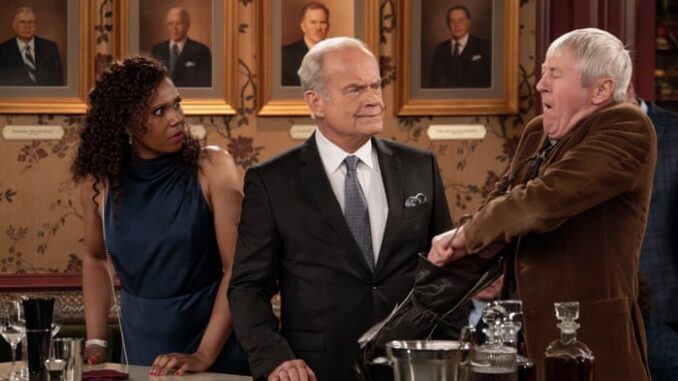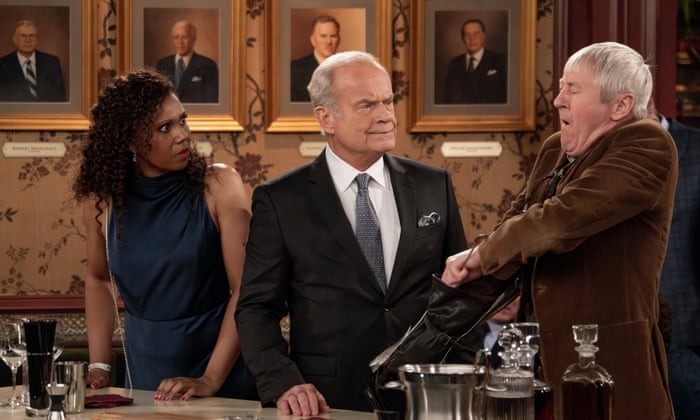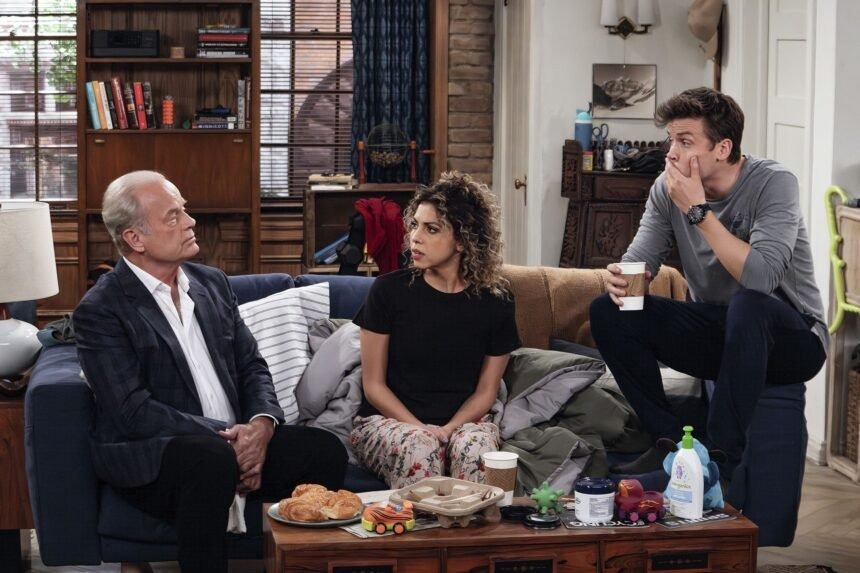
From Taxi to Friends to Will & Grace, he shot TV’s most era-defining shows. But can he make the reboot of Frasier a hit? And is the horny old psychiatrist still such a snobbish buffoon?
Frasier has re-entered the building. Only it’s a different building, in a different city, with an almost entirely different cast of characters – among them his college buddy Alan, played by Nicholas Lyndhurst, AKA Rodney from Only Fools and Horses; Olivia, his new boss, head of the psychiatry department where he takes a job; and a crew of hapless young people, including Frasier’s son Freddy and nephew David.
Fans of the original (myself passionately among them) may be feeling wary about the reboot, which is about to start on Paramount+. The world has changed since Frasier concluded in 2004, in many ways that would doubtless not best please the good doctor. What provocations will our beloved, snobby, horny buffoon Frasier Crane endure in the 21st century? And how will he respond, without his core allies of Niles, Martin, Daphne and Roz?

When I started out, there were three networks and 30 great writers. Now we have 500 networks and 30 great writers
Although Bebe Neuwirth and Peri Gilpin will be returning as Frasier’s ex-wife Lilith and his former colleague Roz, David Hyde Pierce and Jane Leeves, who played Niles and Daphne, both declined to return, while John Mahoney – Frasier’s salt-of-the-earth, ex-cop father and the show’s moral centre – died in 2018. Will fans be left wishing they’d never tuned back in?
It’s a risk that James Burrows acknowledges minutes into our conversation. The veteran sitcom director (and, as co-creator of Cheers, responsible for first bringing the Frasier Crane character to screens, back in 1984) has directed the first two episodes of the new series. “I had nothing to do with the writing of the pilot, or determining what it should be,” says the director, via Zoom from his home in Los Angeles. “I was just handed a script.” Was it an easy decision to take it on? “When Kelsey calls, you say yes!”
Burrows, as a veteran of not just Cheers but also Taxi, Friends and Will & Grace, has been in the game long enough to see his creations resurrected: the first reunion of the Friends cast, in 2016, was staged to honour his 1,000th episode of television. So how does he approach returning to someone he was so instrumental in shaping? “My goal was to protect the character,” he says. “To make sure that the writing was equal to, if not better than, the original, and in essence to protect Kelsey. But I found that the writing was exquisite, certainly as good as the previous show, and so was the cast.”
Burrows got his start in 1974, shooting episodes of The Mary Tyler Moore Show as the mentee of veteran director Jay Sandrich, also known for his work on The Cosby Show and The Golden Girls. His father, Abe Burrows, was a Tony- and Pulitzer-winning writer for Broadway, best known for Guys and Dolls, and James applied his experience of the stage to TV, pioneering in particular the multi-camera approach. “A multi-camera sitcom,” he says, “is basically theatre that you film.”
His stagecraft is obvious elsewhere, too. Frasier fans will be reassured to hear that his new apartment, just like the old one, has a soundproof kitchen for characters to dash off and conspire in. “There’s a farce scene in the kitchen which I enjoyed, because I directed a lot of farces when I was a theatre director,” says Burrows. “You must have swing doors, a dumbwaiter, and a drunk priest.” What about fancy dress parties? “And those.”
As for directing the new cast, Burrows says: “It was about saying to them, ‘Just keep up with Kelsey.’” He can still remember his first glimpse of Grammer, auditioning for Cheers – then a Broadway understudy and 29 years old. It was his casting tape for Cheers. “His face came on and we started laughing,” he says. Was it the big hair? “No! It was just Kelsey. He had this smile on his face – and we loved it.”
On Taxi, Burrows also cast Christopher Lloyd and Danny DeVito (“I mean, look at him”) in what became their breakout roles. “When they audition for you, you can get a sense of, ‘Whoa!’ But you don’t know if that’s going to translate.” Lloyd, he recalls, “came into the room dressed exactly like he ended up being in the first show: denim jacket, blue shirt, tattered jeans, ratty old sneakers, his hair unkempt. We just knew from his first line – but we didn’t know what an audience would think.”
Of all Burrows’ achievements, it is perhaps Friends that most stands out – for its star power, and for being so much larger than the sum of its parts. Yet he is self-effacing about all his successes, stressing the importance of collaboration, respecting the work (and egos) of actors and writers alike. “I give confidence to them and say, ‘Let’s try to go as far as we can with this piece of business.’” Winsomely, he adds: “I’m a psychologist too, you know. If I want to put in something that’s funny, I will make it seem like it was an actor’s idea.”
Burrows places an enormous amount of importance on a good feeling on set, believing it shines through in the final product. “If Teddy Danson was not a nice person, Cheers would have been a difficult show. But because he’s one of the sweetest men I know, and I’m a sweet man, there were no egos. If I’m on a show where that isn’t the case, I’ll leave – life’s too short.”

As director, Burrows says, his role is to keep the cast on their toes while also keeping the peace. “They know the characters so well, it’s easy for them to goof off and simply say the lines. It’s my job to keep them interested, happy, and enjoying it, so that the audience can enjoy it.”
Beyond that, it’s down to fate – and the networks. For all the hit shows Burrows has made, there have been far more pilots that floundered. But he’s sanguine about them. “A lot of times, I start with a script that’s ordinary and make it good – and that’s not good enough. But to have a great script, then make it extraordinary, that’s fulfilling. I’ve had more than enough chances at that.”
These days, he says, you need a lot more than luck to create quality TV, as the system works against it. “When I started out in the 70s, there were three networks and 30 great comedy writers. Now we have 500 networks and 30 great comedy writers. The product is not going to be as good. It’s unfortunate, but anybody with an iPhone can make a show, and that’s what we’re dealing with now. I don’t know if sitcoms are ever going to be back, I really don’t.”
I’ve had a ball. Sitcoms have added years to my life
The rise of the limited series, the approach favoured by streaming services, has dramatically reduced not only writers’ earnings, but their capacity to develop. Even if a show is a hit, says Burrows, actors and writers don’t share in the profits the way they once did. He supports the strike action that has so paralysed the industry of late. “You have people who are running the business now who don’t really understand the business. They just throw shit against the wall and see what sticks.”
He admits to finding it depressing. Of the Frasier reboot, he says: “I’m not sanguine about the product lasting.” But, in keeping with the sunny outlook of his shows, Burrows doesn’t linger on the downbeat note. Next year will be his 50th in the business. “I’ve had a ball,” he says. “It’s added years to my life – because of the laughter.”
The best sitcoms, after all, have always been about comfort, supporting audiences to cope with the modern world. Whether it mollifies diehard Frasier fans or not, the reboot at least gave Burrows solace as a return to familiar (if retreating) ground. “It was a wonderful two weeks with my old friend, my old crew, some I’d been working with since Cheers.” That’s the set he would return to if he could, he says – and also the one show he’d never try to bring back.